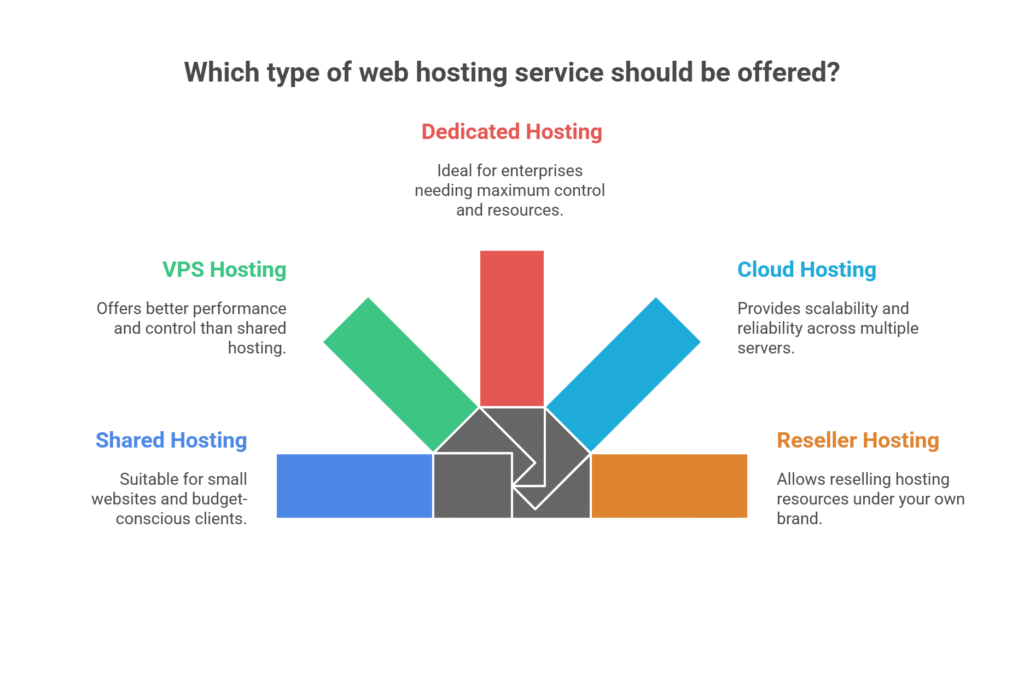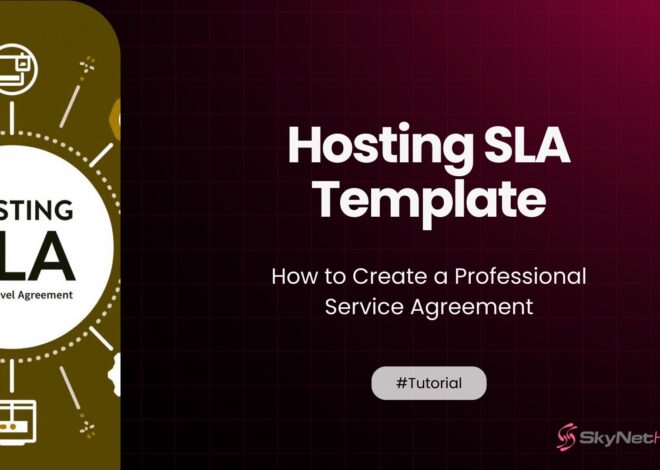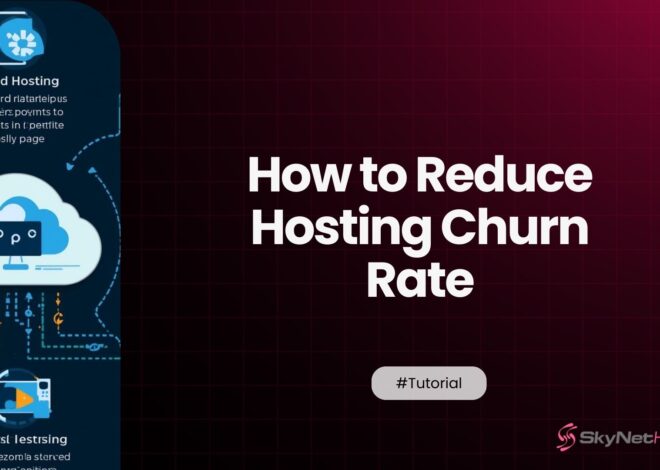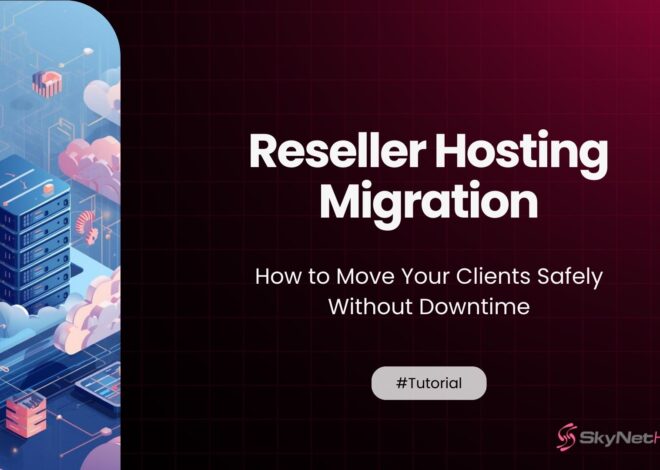
How to Start Your Own Hosting Company in 2025
TL;DR
6 steps for aspiring web hosting entrepreneurs:
- Define your target market and niche.
- Choose a business model: Reseller hosting (low cost, easy start) or build your own servers (costly, complex).
- Handle legal/admin: Register your business, set terms, and ensure compliance.
- Set up hosting infrastructure: Lease servers or use a reseller platform; use control panels and automate billing.
- Design packages and pricing: Offer plans for different needs, upsell add-ons for more revenue.
- Build your website and market: Create a professional web presence, use SEO, and offer solid support.
Pro tip: Use modern reseller platforms for easier scaling and management, and prioritize customer-centric service.
Starting a web hosting business is a lucrative opportunity that lets you tap into the growing demand for websites and online services. If you’re wondering how to start a web hosting business, whether as a web developer, agency owner, or entrepreneur, it’s a great way to offer critical solutions while building a reliable revenue stream.
This guide will walk you through how to start a web hosting business using six simple steps. Plus, we’ll show you how SkyNetHosting.net, a leader in reseller hosting, can make your hosting venture scalable and efficient.
For a deeper understanding of how reseller hosting works and how it can benefit your business, check out our comprehensive Reseller Hosting Guide, packed with everything you need to know to get started and succeed in this space.
Understanding the Web Hosting Industry
What is Reseller Hosting?
Reseller hosting is a special type of web hosting that enables individuals or businesses to purchase hosting resources in bulk from a provider and then resell those resources to their own clients, often under a unique brand. This model is perfect for entrepreneurs, agencies, or freelancers who want to offer web hosting services without the need to manage complex infrastructure or invest in costly server hardware.
With reseller hosting, you get access to a control panel (like WHM/cPanel) that lets you create and manage separate accounts for each of your clients. Many packages include white-label options, so you can apply your branding to billing, support, and control panels, making your business look fully independent and professional.
Key benefits of reseller hosting include:
- Low startup costs: No need to purchase or maintain physical servers.
- Scalability: Easily upgrade your plan as your customer base grows.
- Recurring revenue: Enjoy predictable, monthly income from multiple clients.
- Simple client management: Tools for automated billing, support, and account provisioning.
- Custom branding: Offer hosting under your own business identity.
Reseller hosting provides an accessible entry point for anyone looking to start a hosting business, making it a popular option for those with limited technical knowledge or resources.
What Are the Different Types of Web Hosting Services?

Let’s talk hosting! Knowing the different types of hosting services can really help you figure out what to offer. Here’s a quick rundown:
- Shared Hosting: Multiple websites share a single server, suitable for small websites or budget-conscious clients.
- VPS (Virtual Private Server) Hosting: A step up from shared hosting, VPS provides dedicated portions of a server for better performance and control.
- Dedicated Hosting: Gives clients access to an entire server, ideal for enterprises requiring maximum control and resources.
- Cloud Hosting: Scalable and reliable hosting distributed across multiple servers for enhanced speed and redundancy.
- Reseller Hosting: Allows you to purchase hosting resources in bulk and resell them to clients under your own brand.
When deciding which hosting services to offer to your clients in a web hosting business, it’s important to consider their varying needs and technical expertise.
Shared hosting is a great starting point for small businesses or individuals with basic websites, as it is affordable and easy to manage.
For clients with growing traffic or specific customization requirements, offering VPS hosting can provide them with more control and better performance.
Dedicated hosting is ideal for large enterprises or resource-intensive projects that demand maximum control and reliability.
Carefully evaluating your client base and aligning their needs with the right hosting plans can set the foundation for a successful web hosting business.
Market Trends and Demand
The web hosting market is projected to grow at 15% annually, making it one of the most promising industries in tech. This demand stems from the surge in SMBs, e-commerce, and freelance businesses.
With so much growth, competition is fierce. Hosting companies like Bluehost, SiteGround, and leaders such as SkyNetHosting.net dominate the field. Differentiating yourself with niche services or exceptional customer support becomes critical.
How to Start a Hosting Business with WHMCS
Starting a hosting business in 2025 is easier and more efficient with WHMCS as your automation powerhouse. WHMCS provides an all-in-one client management, billing, and support solution designed specifically for web hosting companies and resellers.
By integrating WHMCS into your hosting business, you instantly automate invoicing, order processing, account provisioning, and even customer support. This not only saves time but also reduces human error—helping you deliver a seamless, professional experience to your clients from the start.
Plus, WHMCS is built to scale effortlessly as your client base grows, making it the ideal tool for anyone serious about launching a successful hosting business in 2025.
Step 1: Planning Your Web Hosting Business
Define Your Target Market and Niche
Identify your ideal customer. Are you catering to e-commerce startups, local businesses, bloggers, or marketing agencies? Narrowing down your audience allows you to tailor your hosting services to match their specific needs.
Choose Your Business Model
There are two main ways to start a web hosting business:
- Reseller Hosting (recommended): A cost-effective way to start without heavy infrastructure investments. Simply purchase reseller hosting plans, rebrand, and resell. With reseller hosting providers like SkyNetHosting.net, you can get started for as little as $6.95/month!
- Owning Infrastructure: Requires investing in servers and data centers upfront. This can be lucrative but involves higher capital and technical expertise.
Legal Considerations
Ensure you register your business and adhere to regulations like data privacy laws. Set clear terms of service and include website disclaimers to build trust.
With SkyNetHosting.net, you don’t have to worry about drafting legal documents from scratch. They offer all the necessary legal documents, including terms of service, privacy policies, and disclaimers, completely free of charge.
This means you can focus on growing your hosting business without the hassle or stress of navigating complex legal requirements. Starting your hosting business has never been easier or more tension-free!
Step 2: Setting Up Hosting Infrastructure
Your hosting infrastructure is the backbone of your business. You need fast, secure, and reliable servers to attract and retain customers.
Leasing Servers or Using Reseller Hosting
Partner with top providers for your server needs. SkyNetHosting.net is an industry leader with benefits such as:
- Free WHMCS automation software to manage accounts effortlessly.
- 900% faster NVMe SSD servers for robust performance.
- End-user support for your clients so you can focus on scaling your business.
Explore all the features and benefits that SkyNetHosting.net has to offer by visiting our detailed feature list.
Technical Requirements
Set your hosting business up for success by equipping yourself with the right tools and resources. Here’s how you can simplify and streamline your hosting operations:
- Use Control Panels for Easy Management
Start with user-friendly control panels like WHMCS. These tools are essential for simplifying website and server management. They allow you to efficiently manage accounts, monitor server performance, and handle customer accounts from one centralized location.
- Automate Billing and Payments
Incorporate reliable billing software to automate customer payments and invoicing. This eliminates the need for manual processes, saves time, and minimizes errors. Automated billing ensures your customers are billed accurately and on time, improving cash flow and reducing administrative effort.
- Get Expert Guidance from Skynethosting.net
If you’re new to hosting or need assistance setting up your business, the Skynethosting.net support team is here to help. They provide step-by-step guidance to ensure you understand how to configure your tools, manage your servers, and grow your business effectively.
By leveraging these tools and expert support, you can create a seamless hosting experience for your customers while optimizing your backend operations. Start building a scalable, efficient hosting business today!
Selecting Data Centers
Choose data centers in strategic locations close to your target audience to significantly improve website performance and reduce latency.
The closer your data center is to your users, the faster your website or application loads, leading to a better user experience and potentially higher customer satisfaction.
Additionally, strategically placed data centers enhance reliability, reduce downtime, and support seamless global connectivity for businesses with a worldwide audience.
SkyNetHosting offers 25 worldwide locations to ensure your data is always close to your users, no matter where they are. This not only improves speed but also helps scale your services effectively.
WHMCS as the Core of a Hosting Business
WHMCS stands out as the essential foundation for running a modern hosting business. Acting as your operational hub, WHMCS simplifies daily management by centralizing client accounts, product provisioning, and support tasks within a single dashboard.
Its automation capabilities streamline crucial processes such as customer onboarding, service setup, suspension, and termination, all with minimal manual intervention.
One of the key advantages of WHMCS is automated billing and invoicing. It automatically generates invoices, sends timely reminders, and processes payments via a wide range of payment gateways. This reduces administrative workload and improves payment accuracy, letting you focus on business growth instead of mundane tasks.
Integration with popular control panels like cPanel makes account management seamless. Through WHMCS, you can automatically provision new hosting accounts, modify service details, or suspend services whenever necessary—saving both time and resources.
WHMCS also enables ticket-based customer support, allowing you to handle client queries, issues, and requests efficiently. With a vast ecosystem of add-ons and integrations—from domain management to email marketing—WHMCS scales as your business grows, ensuring you have all the tools needed for success in the hosting industry.
Step 3 Designing Hosting Packages and Pricing
Your hosting packages play a vital role in attracting and retaining customers. Offering reliable, flexible, and feature-rich plans ensures customer satisfaction and builds trust in your brand.
By tailoring your packages to meet diverse needs, you can stand out in a competitive market and drive long-term growth.
Create Attractive Hosting Plans
Ensure your packages cater to diverse needs:
- Introductory shared hosting for starters
- VPS and dedicated hosting for scalability
- Add-ons like email hosting, SSL certificates, and website backups
Pricing Strategies for Competitive Advantage
Striking the right balance between affordability and profitability is key to gaining a competitive edge with your pricing strategy.
Consider offering options like free trials, introductory discounts, or reduced pricing for the first month to attract new customers. These tactics allow potential customers to experience your product or service with minimal risk, increasing the likelihood of conversion.
For example, SkyNetHosting uses this approach effectively by providing discounted reseller plans, which make their services more appealing compared to competitors while still maintaining long-term profitability. By showcasing value upfront, you can differentiate your brand and build customer loyalty, all while staying competitive in the market.
Upselling Add-ons
Generate additional revenue streams by upselling valuable add-on services tailored to your customers’ needs.
For example, offer premium email services with expanded storage and advanced spam filtering, faster server options for improved website performance, or enhanced security protocols to protect sensitive data.
You can also consider upselling services like regular website backups, priority customer support, or SEO tools to help clients grow their online presence. By presenting these options as solutions to common challenges, you not only increase revenue but also build stronger customer relationships and satisfaction.
At Skynethosting.net, the focus is always on maximizing clients’ profits and helping them succeed. To support this goal, Skynethosting.net offers valuable perks such as free domain reseller accounts and free SSL reseller accounts, enabling clients to expand their revenue streams effortlessly.
Step 4 Building Your Website and Online Presence
Your website acts as the face of your hosting business. Here’s how to make a strong impression.
Create a Professional Website
Ensure your website is easy to navigate and includes:
- A client portal
- A knowledge base with FAQs
- A ticketing system for customer inquiries
SEO Strategies for Visibility
Optimize your website using targeted keywords such as “reseller hosting,” “web hosting business,” and “cloud hosting.” A high-ranking website is key to attracting traffic organically.
Step 5 Marketing Your Web Hosting Business
Getting the word out about your hosting services is critical. Here’s how to market effectively.
Digital Marketing Channels
Focus on platforms where your audience is. Effective channels include:
- SEO for organic growth
- PPC campaigns to drive traffic quickly
- Social media for building relationships with potential clients
Affiliate Marketing Programs
Offer attractive commissions to affiliates and encourage them to promote your hosting services. SkyNetHosting runs a hugely popular affiliate program that drives significant traffic.
Build Trust and Reputation
Encourage customer reviews and testimonials. Potential customers find social proof reassuring!
Step 6 Managing Customer Support and Operations
Top-tier customer service is often the deciding factor in the web hosting industry.
Set Up 24/7 Technical Support
Web hosting issues don’t follow a 9-to-5 schedule. Use tools like live chat software and ticketing systems, and consider outsourcing support to experts like SkyNetHosting’s end-user support service.
Secure Billing Processes
Invest in invoicing tools like WHMCS to manage subscriptions, ensure timely renewals, and maintain secure payment gateways.
Scaling and Growing Your Hosting Business
Once established, scaling becomes the next step.
Upgrade Infrastructure
Expand server capacity when needed. Transition to dedicated cloud servers or scalable systems to handle more clients.
Expand Offerings
Introduce advanced hosting solutions such as VPS and cloud hosting.
Automate Operations
Use software like WHMCS to automate repetitive tasks like account setup and reminders.
Building Recurring Revenue as an Agency
Agencies can unlock powerful recurring revenue streams by offering web hosting as part of their service portfolio.
By bundling hosting services with web design, digital marketing, or ongoing site maintenance packages, agencies can establish predictable, month-to-month income.
WHMCS makes it easy to bill clients automatically, manage subscriptions, and upsell features such as premium support, SSL certificates, or domain registration. This approach not only boosts your agency’s profitability but also creates lasting client relationships through ongoing value and support.
Overcoming Challenges in the Web Hosting Business
Competition and Price Wars
Differentiate by offering value-added services and specialized solutions for your niche.
Technical Downtime
Partner with reliable hosting providers like SkyNetHosting.net to minimize outages and ensure strong uptime guarantees.
Customer Retention
Focus on excellent customer service and deliver consistent value through features like detailed analytics and free upgrades.
Start Your Web Hosting Business Today
Starting a web hosting business is an exciting opportunity in 2025 and beyond. By following these six proven steps, you’ll be well on your way to building a profitable hosting business.
At SkyNetHosting.net, over 20 years of experience helps us support thousands of hosting resellers worldwide. With free WHMCS, lightning-fast hosting solutions, and premium customer support, we ensure your hosting business succeeds from day one.
Take the first step today. Explore SkyNetHosting’s reseller hosting plans and start building your hosting empire!
FAQ
What are the first steps to start a web hosting business?
Begin by defining your target market and niche, choosing between reseller hosting or building your own infrastructure, handling legal registration, setting up hosting infrastructure, designing hosting packages, then building your website and focusing on effective online marketing strategies.
What web hosting business models are available?
You can opt for reseller hosting—an affordable, low-risk entry point where you rebrand and sell services from existing providers—or invest in owning your own servers, which requires higher capital and greater technical expertise but allows more customization and control.
Why is reseller hosting recommended for beginners?
Reseller hosting is ideal for beginners due to its low cost, minimal technical barriers, and ease of management. It enables entrepreneurs to enter the hosting market quickly, scale efficiently, and focus on customer service and marketing without heavy infrastructure investments.
How important is legal compliance in web hosting?
Legal compliance is critical—register your business, draft terms of service, and ensure data privacy adherence. Some providers, like SkyNetHosting.net, offer templates for all necessary legal documentation, allowing you to focus on growth rather than legal complexities.
What tools and infrastructure are essential for starting out?
Essential tools include a reliable hosting provider, control panels like WHMCS for account and billing automation, and strategic data center selection for global performance. Automated billing and robust support infrastructure help streamline operations and ensure a great client experience.
How should hosting plans and pricing be structured?
Offer a range of hosting packages (shared, VPS, dedicated) with tailored features and upsell add-ons like email, SSL, or backups. Use introductory offers or discounts to attract new clients and set competitive prices to balance value and profitability.
What are common challenges in a web hosting business?
Major challenges include fierce competition, technical downtime, and client retention. Overcome these by delivering exceptional customer service, partnering with reliable providers for strong uptime guarantees, automating operations, and continually adding value to differentiate your business.
How do I start a hosting business with no technical knowledge?
Absolutely! You can launch a hosting business even without technical expertise by choosing reseller hosting from a reliable provider and using WHMCS to automate client management, billing, and support.
This user-friendly combination lets you focus on growing your customer base while the platform handles the complex technical details for you.



